Want to stay productive while enjoying your day? Here’s how to create a daily schedule that works for you:
| Feature | Hobonichi Techo | Bullet Journal |
|---|---|---|
| Layout | Pre-structured daily pages | Fully customizable |
| Size Options | A6, A5, Weeks | Multiple sizes available |
| Best For | Detailed daily planning | Creative organization |
Start with a simple planner, organize your time with purpose, and add a bit of creativity to make it your own.
Choosing the right planner can make all the difference in sticking to a productive routine. The Hobonichi Techo provides structured layouts, while bullet journals let you design every detail. Your choice depends on whether you prefer a pre-set structure or complete creative freedom.
Here’s a quick comparison to help you decide:
| Feature | Hobonichi Techo | Bullet Journal |
|---|---|---|
| Layout | Pre-structured daily pages | Fully customizable |
| Size Options | A6, A5, Weeks | Multiple sizes available |
| Best For | Detailed daily planning | Creative organization |
Turn your planner into something you’ll love to use by adding personal touches. For example, Dark Moon Paper offers themed sticker kits like Lilac Dusk and Winter Hygge that can instantly transform plain pages. They also have functional stickers for checklists and headers, blending style with utility. These small details can make planning more enjoyable and keep you motivated to stay consistent.
Once your planner is both functional and visually appealing, you’re ready to organize your day for better results.
Plan your day using time-blocking to reserve your most productive hours for important tasks. Tools like the Eisenhower Box and time-blocking techniques can help you prioritize effectively [1] [3].
Structure your day with focused work blocks – try 90 minutes for deep work and 25 minutes for quicker tasks. Add 15-minute breaks to recharge. Start each morning with a quick 10-minute review to set priorities and ensure your focus stays on what matters most.
With your day planned and your priorities clear, your schedule will work harder for you.
Stickers can bring a playful and personal touch to your planner. Themed collections like ‘Electric Forest‘ or seasonal designs can highlight tasks while adding flair. Functional stickers help you stay organized, and decorative ones keep your planner visually appealing. Motivational or seasonal stickers can also keep your layouts engaging and fresh.
Once you’ve made your planner both practical and expressive, you can take it further by creating layouts that truly reflect your personality.
Turn your planner into more than just a scheduling tool by adding moments of reflection. Try interstitial journaling – quick notes written between activities – to process your thoughts and stay focused [5]. You could also set aside a section for gratitude or jotting down small wins from your day.
| Time of Day | Planning Focus | Reflection Activity |
|---|---|---|
| Daytime | Daily priorities | Gratitude and quick wins |
| Evening | Preparing for tomorrow | Lessons learned today |
Adding reflection to your planning routine gives it more depth and meaning, making your planner a tool for both organization and self-improvement.
Let your planner reflect your personality with thoughtful design choices. Use color-coding to create a visual system – warm colors for urgent tasks and cool tones for long-term goals. Add personal touches like hand-lettered headers or quotes that inspire you.
You can also create sections for different areas of your life. For example, use washi tape to separate work and personal goals. The aim is to keep your planner functional while showcasing your unique style through these creative elements.
A well-rounded schedule includes time for work, personal development, and relaxation. For example, you might dedicate mornings to focused tasks, afternoons to learning or skill-building, and evenings to unwinding with hobbies or spending time with loved ones. Taking regular breaks between these blocks can help keep your energy and focus intact.
| Time Block | Focus Area | Activity Examples |
|---|---|---|
| Morning | Deep Work | Tackling big projects, problem-solving |
| Afternoon | Growth | Learning new skills, training |
| Evening | Relaxation | Reading, hobbies, or family time |
Even with a good plan, life often throws curveballs, and being able to adjust is just as important as having a schedule.
Tools like bullet journals or digital planners can help you pivot when plans shift [2][4]. If something unexpected comes up, focus on your top priorities and let go of less critical tasks for the moment. The trick is having a system that allows you to adjust without losing track of your main objectives.
Once you’ve made changes, keeping an eye on your progress will help you stay on course.
Set aside time each week to review how you’re doing and fine-tune your approach [1][2]. Dr. Chris Mosunic highlights the value of SMART goals for staying on track [1]. Use your planner to note what you’ve accomplished and any insights about what worked or didn’t.
During your reviews, think about these areas:
| Review Focus | Questions to Ask | Action Steps |
|---|---|---|
| Productivity | Did I complete my most important tasks? | Adjust your schedule as needed |
| Well-being | Did I balance work and personal time? | Shift time toward self-care if needed |
| Growth | Am I making progress toward my goals? | Update your goals or milestones |
Consistency doesn’t mean you have to stick rigidly to your plan. The best routines offer enough structure to stay on track but leave room for flexibility, making it easier to stay productive while enjoying your day-to-day life.
Creating a schedule that works means balancing structure with flexibility. Time-blocking can help you focus on priorities, while adding personal touches keeps you motivated. The goal is to build a system that’s both effective and enjoyable to stick with.
Pick tools – whether digital apps or a classic notebook – that match your preferences and make planning something you look forward to. Even small additions like themed stickers can turn a plain planner into a tool you’ll want to use daily.
Here are some key components to consider for your planning system:
| Component | Purpose | Tips for Use |
|---|---|---|
| Time Blocks | Manage Focus | Dedicate specific time slots |
| Personal Touches | Stay Motivated | Add visuals that inspire you |
| Review System | Track Progress | Set regular check-in moments |
Let your system grow with you. Use SMART goals to measure progress and try out different planning methods until you find the one that fits best. The aim is to create a routine that keeps you on track and feeling good.
Stickers Made for Planning
Our custom stickers are a fuss-free way to brighten up your planner pages with perfectly-sized designs that add a spark of personality to every layout.
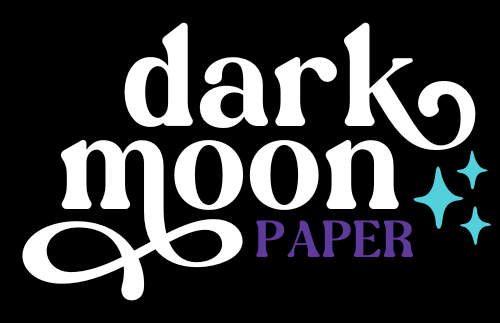
Why use planner stickers?
Planner stickers make organizing easy, fun, and personal! Add color, creativity, and structure to every page, transforming your planner into a tool that reflects you. Perfect for tracking, decorating, and staying inspired daily!
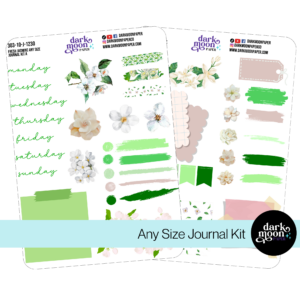
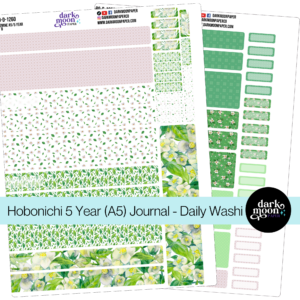
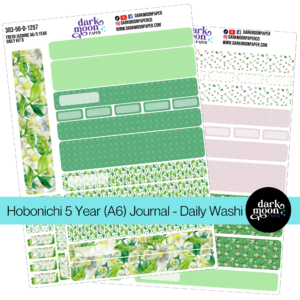
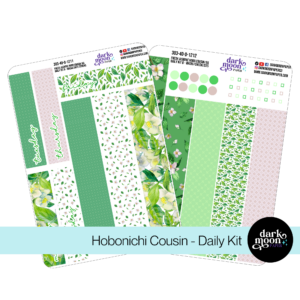
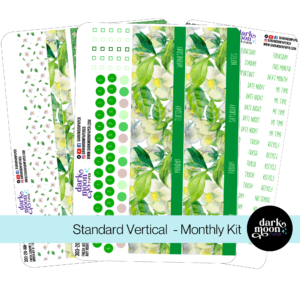
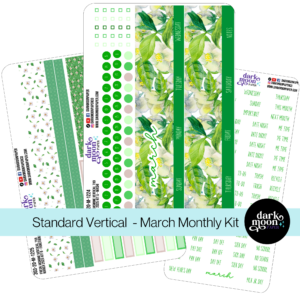
Hello and welcome!
I’m Rachael Snow, a lifelong artist and entrepreneur, and I started Dark Moon Paper to blend my love of art, technology, and the mysterious beauty of the world around us. My sticker kits are meant to set the mood, tell a story, and give you a little escape from the ordinary.
I work from my cozy studio tucked away in the beautiful woods of Oregon, surrounded by nature and a dark night sky full of stars.